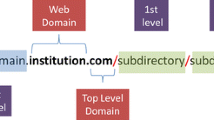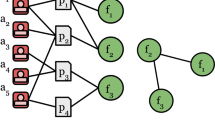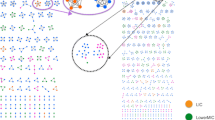Abstract
The paper demonstrates visualization technique that show the collaboration structure of institutions in the specialty and the researchers that function as weak ties among them. Institution names were extracted from the collection of papers and disambiguated using the Derwent Analytics (v1.2) software product. Institutions were clustered into collaboration groups based on their co-occurrence in papers. A crossmap of clustered institutions against research fronts, which were derived using bibliographic coupling analysis, shows the research fronts that specific institutions participate in, their collaborator institutions and the research fronts in which those collaborations occurred. A crossmap of institutions to author teams, derived from co-authorship analysis, reveals research teams in the specialty and their general institutional affiliation, and further identifies the researchers that function as weak ties and the institutions that they link. The case study reveals that the techniques introduced in this paper can be used to extract a large amount of useful information about institutions participating in a research specialty.
Similar content being viewed by others
References
Björneborn, L., Ingwersen, P. (2001), Perspectives of webometrics. Scientometrics, 50(1): 65–82.
Börner, K., Penumarthy, S., Meiss, M., Ke, W. M. (2006), Mapping the diffusion of scholarly knowledge among major us research institutions. Scientometrics, 68(3): 415–426.
Chubin, D. E. (1976), Conceptualization of scientific specialties. Sociological Quarterly, 17(4): 448–476.
Debackere, K., Clarysse, B. (1998). Advanced bibliometric methods to model the relationship between entry behavior and networking in emerging technological communities. Journal of the American Society for Information Science, 49(1): 49.
De Nooy, W., Mrvar, A., Batagelj, V. (2005), Exploratory Social Network Analysis with Pajek. New York, Cambridge University Press.
Otte, E., Rousseau, R. (2002), Social network analysis: a powerful strategy, also for the information sciences. Journal of Information Science, 28(6): 441–453.
Granovetter, M. S. (1973), The strength of weak ties. American Journal of Sociology, 778(6): 1360–1380.
Havemann, F., Heinz, M., Kretschmer, H. (2006), Collaboration and distances between German immunological institutes. Journal of Biomedical Discovery and Collaboration, 1(1): 6–6.
Katz, J. S., Martin, B. R. (1997), What is research collaboration? Research Policy, 26: 1–18.
Kretschmer, H., Aguillo, I. F. (2004), Visibility of collaboration on the web. Scientometrics, 61(3): 405–426.
Kretschmer, H., Kretschmer, U., Kretschmer, T. (2005), Visibility of collaboration between immunology institutions on the web including aspects of gender studies. Paper presented at the 10th International Conference of the International Society for Scientometrics and Informetrics, (pp.750–760). Stockholm, Sweden: Karolinska University Press.
Leydesdorff, L. (1998), Theories of citation? Scientometrics, 43(1): 5–25.
Melin, G., Persson, O. (1996), Studying research collaboration using co-authorships. Scientometrics, 36(3): 363–377.
Morris, S. A., Boyack, K. W. (2005), Visualizing 60 years of anthrax research, 10th International Conference of the International Society for Scientometrics and Informetrics, (pp. 45–55). Stockholm, Sweden: Karolinska University Press.
Morris, S. A., Yen, G. (2004), Crossmaps: Visualization of overlapping relationships in collections of journal papers. Proceedings of the National Academy of Sciences of the United States, 101(suppl. 1): 5291–5296.
Morris, S. A., Yen, G., Wu, Z., Asnake, B. (2003), Time line visualization of research fronts. Journal of the American Society for Information Science and Technology, 54(5): 413–422.
Nagpaul, P. S. (2002), Visualizing cooperation networks of elite institutions in India. Scientometrics, 54(2): 213–228.
Pencharz, PB, Durie, PR (2000), Pathogenesis of malnutrition in cystic fibrosis, and its treatment. Clinical Nutrition, 19(6): 387–394.
Salton, G. (1989), Automatic Text Processing: the Transformation, Analysis and Retrieval of Information by Compute. Reading, MA: Addison-Wesley, 1989.
Wagner, C. S. (2005), Six case studies of international collaboration in science. Scientometrics, 62(1): 3–26.
Wasserman, S., Faust, K., Iacobucci, D. (1994), Social Network Analysis: Methods and Applications. Cambridge. Cambridge University Press.
Author information
Authors and Affiliations
Corresponding author
Rights and permissions
About this article
Cite this article
Yang, L., Morris, S.A. & Barden, E.M. Mapping institutions and their weak ties in a specialty: A case study of cystic fibrosis body composition research. Scientometrics 79, 421–434 (2009). https://doi.org/10.1007/s11192-009-0428-9
Received:
Published:
Issue Date:
DOI: https://doi.org/10.1007/s11192-009-0428-9




